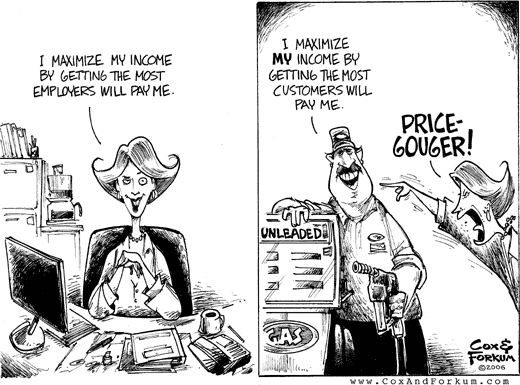First, there’s a lot of good economics in this cartoon:

Don Boudreaux asks how to solve the energy crisis?
He certainly favors the second approach.
We could appoint experts, give them our collective blessing and lots of our tax dollars, and set them to work on finding a solution. Or we could keep the process decentralized, letting the current high profits earned by many oil and gas producers attract entrepreneurs into the energy industry, each creatively exploring (both figuratively and literally) for new and less-expensive sources of fuel.
In another post, Dr. Boudreaux also offers this thought that really struck me:
Too bad indeed! I wonder why people don’t react with the same hostility to the housing market that they do towards the gas market? Surely they don’t only favor ridiculous price hikes that makes them rich, while trying to use law and government to keep others from benefiting in a similar way in another market? Then again, maybe so. That would explain why the Senate is demanding oil company records.
Too bad homeowners don't post their property taxes, and the prices of their homes, the same way that gasoline retailers post their prices.
Thomas Sowell explains his thoughts about what’s going on:
Jane Galt also shares some great thoughts about some of the economics that makes gas so special. In this, she links to this must-read post by Daniel Drezner.
Is it rocket science that, when oil prices hit new highs, gasoline prices also hit new highs? Do you think the price of wheat could double without the price of bread going up? Would we have politicians running around spouting off about "gouging" by Big Wheat?
No matter how big American oil companies are, there are other oil companies around the world and the price of oil is determined in international markets. As for investigating Big Oil, that has been done time and again already, with nothing to show for it.
Prices are a symptom of an underlying reality. Politicians can seize on the symptom and even pass laws dealing with it, without changing the underlying reality.
Prices are like a thermometer reading. When someone has a fever, it is not going to do any good to put the thermometer in ice water to bring down the reading. If you think the fever is gone, it may not be long before the patient is gone, if you don't do something about what is causing the fever.
Ironically, the people who are making the most noise about the high price of gasoline are the very people who have for years blocked every attempt to increase our own oil supply. They have opposed drilling for oil off the Atlantic coast, off the Pacific coast, or in Alaska. They have prevented the building of any new oil refineries anywhere for decades.
They have fought against the building of hydroelectric dams or nuclear power plants to generate electricity without the use of oil. They love to talk about their own pet "alternative energy sources," without the slightest attention to what these would cost in terms of money, jobs, or our national standard of living.
Here’s an interactive map showing how gas prices vary around the US.

Matrix also links to this map and shares some thoughts on how gas prices might impact the housing market.
Finally, in other gas-related news, it looks like some scientists have figured out a way to make gas-free beans…

Now where’s the fun in that???
1 comment:
I know you liked those jokes, here's another relevant one I've seen floating around:
Three guys are in a jail cell. They start to talking and find out that they’re all gas station owners.
The first one says, “I set my prices at a couple of cents higher than my competitors. I’m in here for price-gouging.”
The second one says “I set my prices at a couple of cents lower than my competitors. I’m in here for predatory practices.”
The third one says “I've got you both beat! I set my prices at the same price as my competitors. I’m in here for collusion!”
Post a Comment